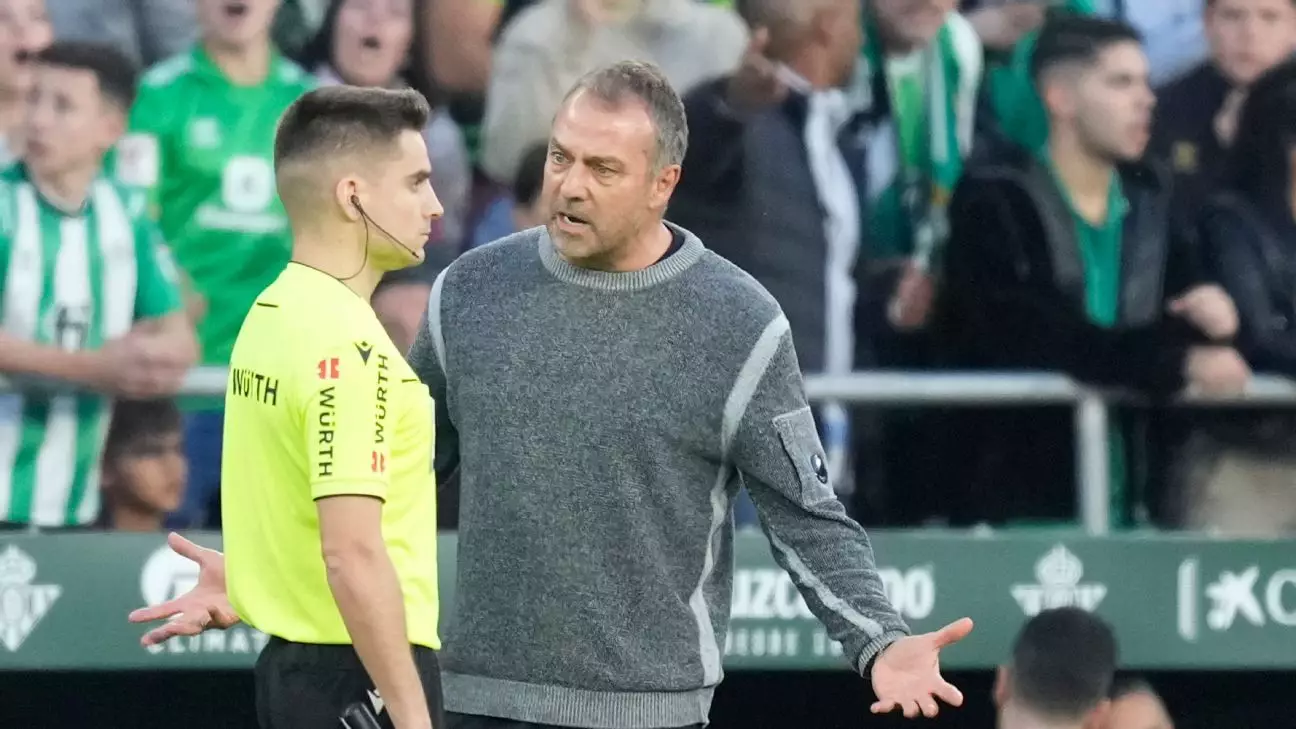In the vibrant realm of football, referees serve as the unsung heroes who uphold the integrity of the game. Yet, their role has become increasingly perilous, especially in Spain, where recent events have highlighted the alarming treatment of match officials. Hansi Flick, the head coach of FC Barcelona, has stepped forward to defend these individuals, emphasizing the need for respect and reform within Spanish football. With threats against referees escalating and key stakeholders raising concerns, it is essential to analyze the current climate surrounding officiating in LaLiga.
The current atmosphere for referees in Spain has reached a boiling point, particularly following formal complaints filed by Real Madrid. They accused the refereeing standard of “adulterating” LaLiga, igniting a firestorm of scrutiny directed at match officials. The most recent incident involved referee José Luis Munuera Montero, who faced severe backlash after issuing a red card to Real Madrid midfielder Jude Bellingham. This decision prompted a wave of death threats against Munuera, reflecting the precarious nature of refereeing in a competitive league.
Such instances are indicative of broader systemic issues. Referees are often subjected to public scrutiny, with their decisions analyzed and criticized from multiple angles, leaving their families vulnerable to the fallout. It is a sad reality that those who dedicate their lives to enforcing the rules of the game are frequently underappreciated and threatened. Flick’s comments resonate here, emphasizing the dire need to recognize referees as human beings who, like players and coaches, can make mistakes.
Flick’s impassioned plea for the Royal Spanish Football Federation (RFEF) to adopt a more protective stance towards referees is vital in this context. He asserts that the federation must demonstrate its authority and commitment to safeguarding officials from threats and criticism. “They are human,” Flick remarked, urging the need to change the culture that perpetuates hostility towards referees. His call for action comes at a crucial juncture—where the RFEF has an opportunity to reshape the landscape of officiating in the league.
In response to the growing tensions, the RFEF has initiated a commission to evaluate potential reforms in the refereeing system. The objective is to enhance the support structures surrounding match officials, enabling them to perform their duties without fear of harassment. This reform is not only about improving the conditions for referees but also about enriching the overall quality of football in Spain.
The implementation of the Video Assistant Referee (VAR) system aims to mitigate errors in decision-making, yet it has inadvertently contributed to the pressures faced by referees. Flick insists on the importance of trusting the officials to make decisions—whether assisted by technology or not. Memories of times when matches proceeded without VAR serve as a reminder that human error has always been a part of the game. It is integral for players, coaches, and fans alike to maintain faith in the judgement of referees, irrespective of the tools at their disposal.
The pressure on referees has been compounded by high-stakes matches and magnified media scrutiny. The fallout from controversial decisions can be severe, not just for the officiating team but for the broader community. Each match feels like a battle, exacerbating the hostile environment in which referees operate. Flick’s insistence on the need for respect aims to foster dialogue and understanding between all parties involved in the sport.
Looking ahead, a collective effort is required to restore faith in the refereeing process. Stakeholders must prioritize dialogue over condemnation and recognize the contributions of referees to the beautiful game. As Barcelona prepares for their upcoming clash against Las Palmas, it serves as a reminder that the focus should remain on what takes place on the pitch rather than the individuals enforcing the rules.
Ultimately, the future of Spanish football hinges on a cultural shift—one that fosters respect for referees and values their contributions to the sport. Hansi Flick’s remarks are more than just a defense of referees; they embody a crucial message that must resonate throughout LaLiga and beyond. Proper measures must be prioritized to ensure that match officials can perform their roles without the specter of threats hanging over them. Only then can football truly thrive while honoring the integrity of its officiating body.

